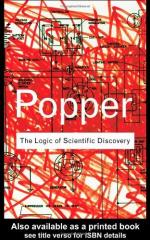
|
| Name: _________________________ | Period: ___________________ |
This test consists of 5 multiple choice questions, 5 short answer questions, and 10 short essay questions.
Multiple Choice Questions
1. What is one approach to knowledge considered by Popper?
(a) Common sense.
(b) Accidental.
(c) Inductive.
(d) Purposive.
2. What does Popper give credit to conventionalism for doing?
(a) Linking theory to experiment.
(b) Adapting to varying conditions.
(c) Blind acceptance of logic.
(d) Offering differing opinions.
3. How do conventionalists view Poppers beliefs on the underpinnings of new discoveries?
(a) Logical.
(b) Good judgment.
(c) A collapse of science.
(d) Unwarranted.
4. What does Popper feel is a fruitless exercise?
(a) Naming logical things.
(b) Naming metaphysical things.
(c) Naming universal things.
(d) Naming singular things.
5. What can observation do for science?
(a) Justify statements.
(b) Establish the truth of a statement.
(c) Provide information on facts.
(d) Assume falsification.
Short Answer Questions
1. What does Popper states the "game of science" is?
2. Popper feels the principle of causality is not falsifiable and therefore regards it as what?
3. How does logic serve in determining if a statement is testable?
4. What should the rules of epistemology adhere to?
5. What does Popper say methodological rules are?
Short Essay Questions
1. According to Popper, what should epistemology do?
2. What must be assumed to justify a universal statement?
3. What is Fries' trilemma?
4. What must an experimenter do in order to test a theory?
5. What is the purpose of empirical systems being consistent and falsifiable?
6. How does one make a statement falsifiable?
7. What is the conventionalist view of science?
8. How does Popper define a scientist?
9. Why does Popper view positivism as narrow, limited, and misguided?
10. What argument does Popper present against conventionalists and positivists regarding the testing of a theory?
|
This section contains 710 words (approx. 3 pages at 300 words per page) |

|




